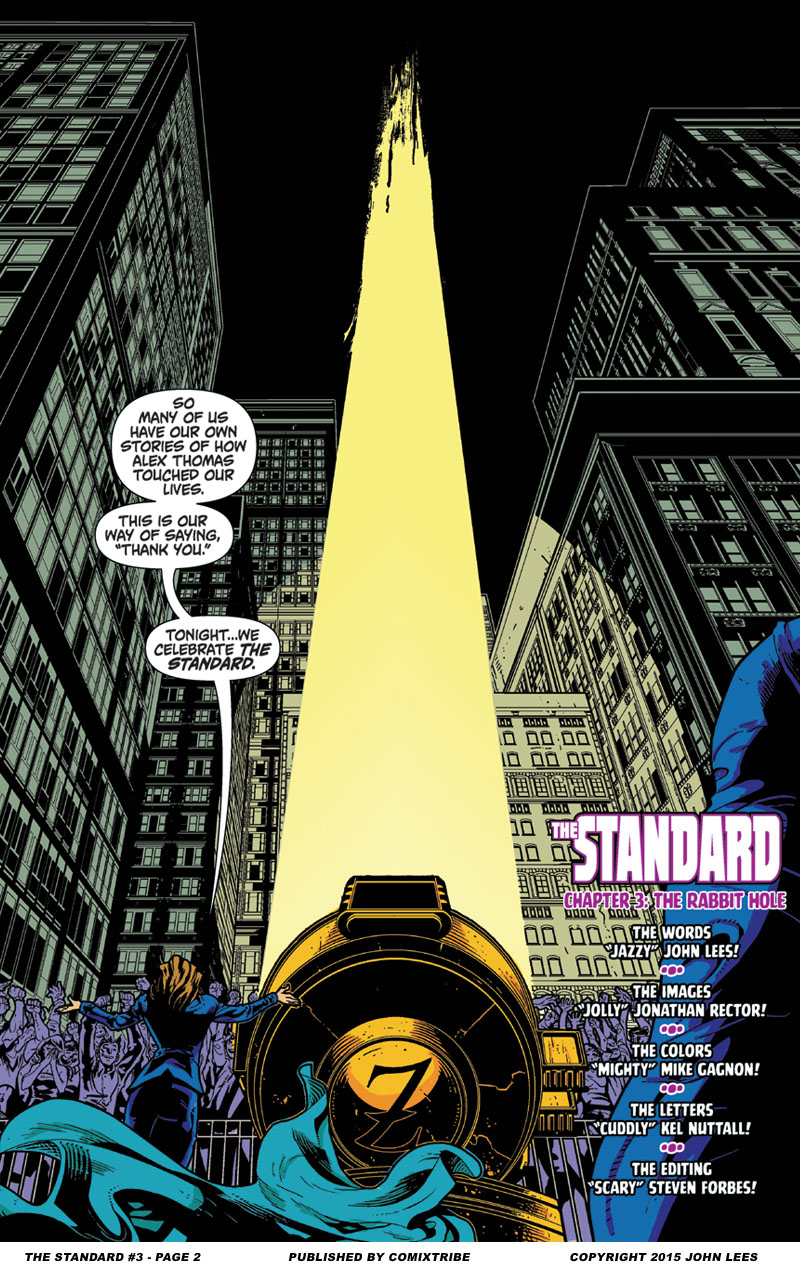The Standard #3 – Page 2
Another lovely title/credits splash page by Jonathan Rector!
As touched on yesterday, there was a bit of an editorial battle-of-wills going on behind the scenes in the production of this issue. So, I’ve once again brought in editor Steven Forbes to talk a bit about his memories of the conflict…
Welcome back, Steve! Now, this opening scene for Chapter 3 is quite different from the first draft in the script. Originally, this issue opened with a group of masked kids on a bank heist, and The Standard stepping in to stop them. Can you remember your thoughts on that early version of this chapter?
I’m getting old, John, and my memory is going…
Let’s see if I can remember this without the benefit of email.I like to start back at the beginning. I remember we went through the plots, and I approved them all after some minor tweaking here and there.I saw you growing from issue to issue, like a flower blooming.When we got to issue three, though, the plot that was written and approved, and the story that was written based on that plot–they didn’t fit. There was a huge disconnect because you had grown as a writer. It was going to need a total rewrite.I remember thinking to myself, John isn’t going to like this.And I was right.
And my calm, measured reaction was a little bit like this:
I remember talking to my wife after I got your email.“John’s going to fire me,” I said.She didn’t believe me.She, however, didn’t feel your frustration. I did. I knew you weren’t happy, and I knew that if I didn’t get you to see it from my point of view, you were going to never trust me again, and you were going to fire me.Most of the time, the plot is the plot, and things don’t move that much. Writers don’t grow that much from issue to issue that would cause the need for a rewrite.And I had to stick to my guns, because I knew it was right for the story. It was your story to tell, but I had to make sure I was doing right by the story and by the reader. And I knew that you were going to kill me. I could feel it in our exchanges. You heard me, but you didn’t trust me. To me, it felt like you thought I was trying to change the story because I was on a power trip or something. Especially when I sent you a revised plot to springboard from.I didn’t think an ocean would be enough space between us…
I remember that quite vividly.I know you didn’t want to rewrite it, but you did it. And in that rewrite lay my job.I know what you say, but that’s how I felt: that my job was on the line. I made the deal with you, but I knew that if you didn’t like it, I’d be gone.It was a test. A “does Steve know what the hell he’s talking about” test. And I wanted to pass, because I knew how good you were.And when you wrote it and liked it better than the original…I felt relief. It wasn’t vindication I felt. Pure relief.I also felt our bond become stronger, because I felt that I showed you that I wouldn’t lead you astray; that it wasn’t about my ego, but about the story. I felt that that test cemented us together.
This is what I wish more writers understood: a good editor isn’t there to muck up your story. A good editor is there to help you tell the story to the best of your ability.I think the issue came out much stronger than the original because I challenged you, and the trust that we built over this issue saw us through the rest of the series when it came time for decisions to be made, such as cover choices.When I didn’t get fired after you rewrote it, my wife asked me how the rewrite turned out. I said it turned out like I expected it to: outstanding. Not only that, John really liked how it turned out, too. I then told her that I think he trusts me more now. She asked me what I was going to do with that.I said “not abuse it.”
Thanks again, Steve, for stopping by to talk a little about the editorial process and the challenges that can crop up. As I go through my commentary for this issue, I’ll be sure to highlight the scenes that were additions brought in through redrafts. I’m sure the readers will agree they make this chapter richer. Always a pleasure chatting with you!






Discussion ¬